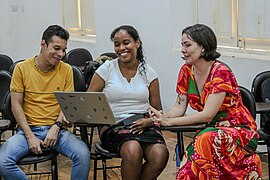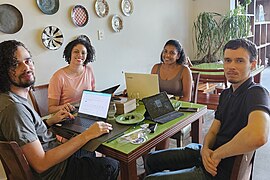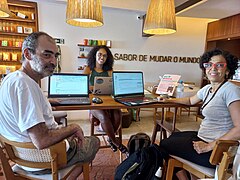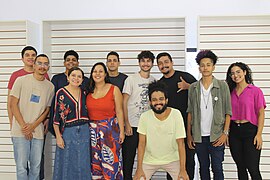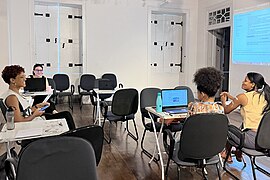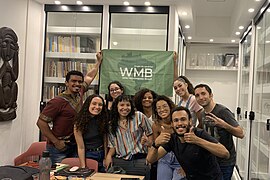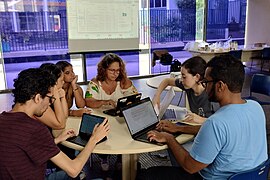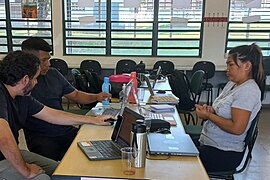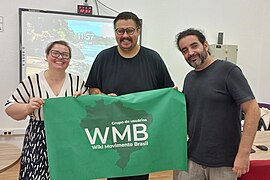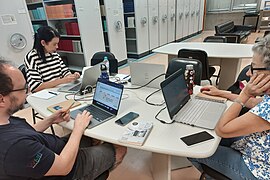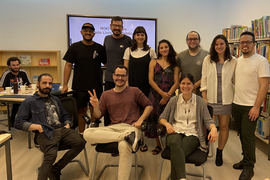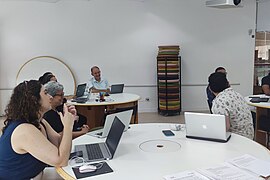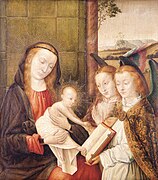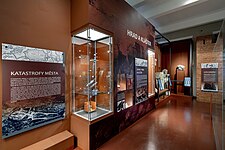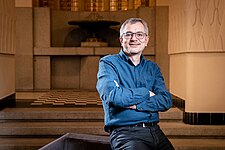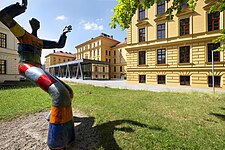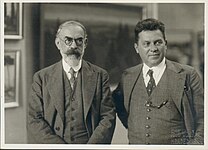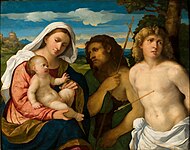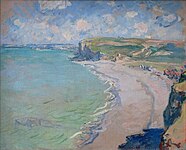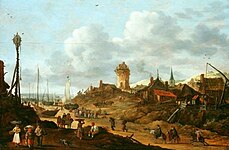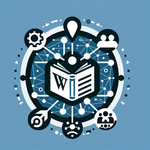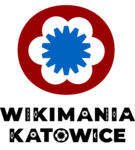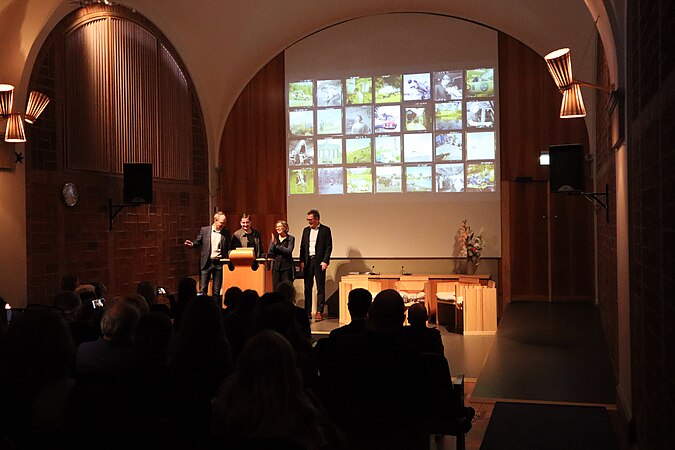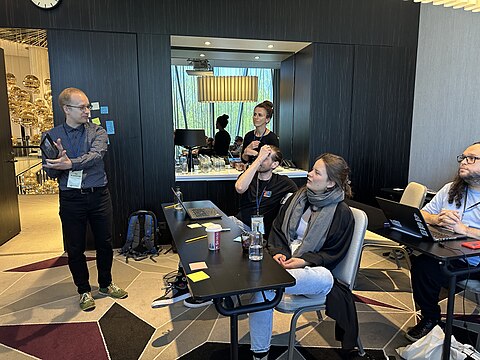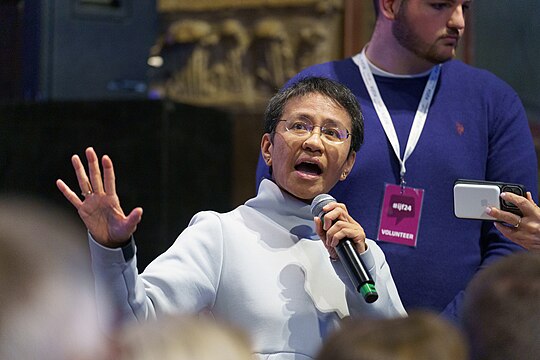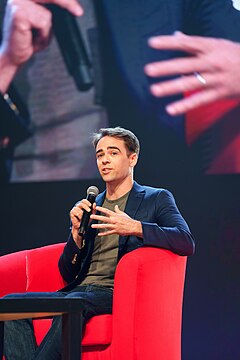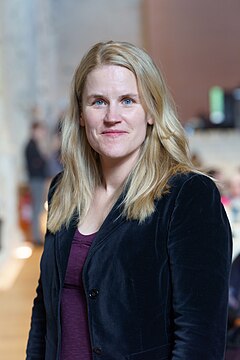GLAM/Newsletter/April 2024/Single
International Roma Day Editathon in Albania and Kosovo, 2024
Albania and Kosovo joined the initiative of International Roma Day that Wikimedia Serbia and Wikimedia CEE Hub have organized in 2024 with the aim of writing and improving articles on the Roma community.
On April 13th, Wikimedians of Albanian Language User Group planned one editathon in Tirana and one in Prishtina. For this editathon, Prishtina collaborated with Çikat n’STEM Hub, that closely works with the Roma community in Kosovo. A group of young Roma girls translated and improved articles for the Roma women in Kosovo.
14 contributors from Albania and Kosovo worked on several Wikipedia articles focusing on the Roma community. They translated 10 articles and edited 60 articles. This year, the participants made 82 total revisions on Wikidata, further enriching the knowledge available about the Roma community in Albanian. These revisions are crucial towards ensuring that accurate about the Roma community is accessible to all.
Some pictures from the event:
Social media
- We have a public Telegram channel (language used mostly Albanian) if you want to join and discuss Wikimedia projects.
If you want to see more about our activities, you canː
- Like our Facebook page, follow us on X formerly Twitter or Instagram.
New images from Central Australia on Wikimedia Commons, Library Science WikiProject students edit Wikipedia & 1Lib1Ref in Australia and New Zealand
Central Australian images on Wikimedia Commons
Further Central Australian images have been added to Wikimedia Commons. In 2024, Wikimedia Australia entered into a partnership with Alice Springs Public Library to add images from their Central Australian Historical Images Collection to Wikimedia. 85 images taken primarily in Alice Springs (Mparntwe) by Anton Faymann from 1957 and 1958 have made their way onto Wikimedia Commons and been added to Wikipedia pages as well. Read more about the project.
Featured Images from the Anton Faymann Collection
ANZSI-CSU SICS-Wikimedia Australia Partner Project Update
Students from across the range of Bachelor’s and Master’s degree courses at Charles Sturt University have been participating in regular ‘Wikithons’ throughout March and April, alongside members of the Australian and New Zealand Society of Indexers (ANZSI). Led by Mary Coe and Pru Mitchel, as part of the Library and Information Science WikiProject, participants have been filling gaps in library and information science (LIS) related content on Wikimedia platforms whilst also developing their skills and confidence in Wiki editing. Read the update. Read more about the project
1Lib1Ref

Imagine a World where every librarian added one more reference to Wikipedia. Join Wikimedia Australia and Wikipedia Aotearoa New Zealand for 1Lib1Ref, 15 May to 5 June. Join us online to learn how to edit Wikipedia and add your references, and we'll also send you a free laptop sticker. Everyone is welcome! Enrol in the Dashboard here to have your citation counted. See our project page for more details.
Wiki Library Month

As we told in our April 2023 report, Every Book Its Reader (#EveryBookItsReader) is a global campaign to increase quality content about books and writers in Wikimedia platforms, specially Wikipedia, Wikidata, and Wikimedia Commons. The campaign name is the third of the Ranganathan’s five laws of library science. In Brazil, the campaign is organized by Lilian Viana (Library of ECA/USP) and Stela Madruga (Library of IME/USP), with Wiki Movimento Brasil's support.
In celebration of the month of books, for this 2024's edition, we gathered this campaign and the first day of community meetings throughout Brazil. On April 6th, we brought together more than 150 people in 16 meetings, at 13 municipalities across the country. Libraries, cultural centers, museums and cafés welcomed experienced Wikipedians and newcomers to celebrate writers and their works. The activities were really productive: more than 250 articles were edited and 30 were created.
And the results were phenomenal: Brazil was the country that contributed the most to the global campaign. See below the progression of the contributions of the two editions:
| Year | Active editors | Articles created | Articles edited | Bytes added |
|---|---|---|---|---|
| 2023 | 14 | 26 | 1,043 | 349,875 |
| 2024 | 200 | 252 | 21,9K | 19,2M |
See some pictures of the day 6th:
-
Campinas, São Paulo
-
Cuiabá, Mato Grosso
-
Feira de Santana, Bahia
-
Ilhéus, Bahia
-
Natal, Rio Grande do Norte
-
Porto Alegre, Rio Grande do Sul
-
Recife, Pernambuco
-
Rio de Janeiro, Rio de Janeiro
-
Salvador, Bahia
-
Salvador, Bahia
-
São Carlos, São Paulo
-
São Carlos, São Paulo
-
São Luís, Maranhão
-
São Paulo, São Paulo
-
São Paulo, São Paulo
-
Sorocaba, São Paulo
![]() We also had two extra "Every Book, Its Reader" editathons organized in the city of Rio de Janeiro: one at the Library of the Goethe-Institut Rio de Janeiro, on April 15, and another at Museu de Astronomia e Ciências Afins, on April 24.
We also had two extra "Every Book, Its Reader" editathons organized in the city of Rio de Janeiro: one at the Library of the Goethe-Institut Rio de Janeiro, on April 15, and another at Museu de Astronomia e Ciências Afins, on April 24.
![]() See the DIFF on how to organize 16 simultaneous meetings, at 13 municipalities, in different regions of the country (only in Portuguese).
See the DIFF on how to organize 16 simultaneous meetings, at 13 municipalities, in different regions of the country (only in Portuguese).
Four new partners


Biblioteca Escolar Municipal do Dique - José Lins do Rego (BEM do Dique) is a library in the community of Jardim América, a neighborhood in the city of Rio de Janeiro. Ester da Silveira, librarian and manager of BEM do Dique, attended to the Goethe-Institut extra editathon and saw in a GLAM-Wiki partnership a possibility to strengthen ties with her community and reactivate the space which suffered with a flood in January 2024.
Associação Brasileira de Estudos Cemiteriais is a non-profit organization based at Mathias Haas Funeral Memorial, in Blumenau (Santa Catarina, Brazil). ABEC gathers students, professors and researchers who study manifestations of death in Brazil; as graves and cemeteries that are listed as cultural heritage (a knowledge gap in Wiki).


Transite is a photo-project held between 2013 and 2016. This collection of more then 10,000 pictures will help us to illustrate the Brazilians and their bicycles in all Brazilian states.
Memória & Arte is a company specialized in cultural management, conservation and restoration of special collections. The activities of this partnership will be carried out in the area of transcribing handwritten documents on Wikisource. Memória & Arte will bring knowledge to Wiki! We are organizing a Wikiversity course on how to use WikiSource for transcribing old manuscripts that are part of our GLAM-Wiki partners, as Livros do Banguê and the Minutes of MonGeral from 1835 to 1977; both recognized as Memory of the World by UNESCO.
First batch from Eva Klabin
Casa Museu Eva Klabin is a museum located in the Lagoa neighborhood, Rio de Janeiro, Brazil. It was established in 1990 and officially opened to the public in 1995. The museum is the former home of Eva Klabin, a collector who bequeathed to the city of Rio de Janeiro a collection of almost 50 centuries of works of art, furniture and decorative ornaments, from Ancient Egypt to Impressionism.
This is the first batch from its collection to Wikimedia Commons, confirming its commitment to Open Knowledge. They've uploaded 112 photographs, a sample of each of its nine collection: Applied art (14 F); British (3 F), Dutch and Flemish (9 F), Egyptian (18 F), French (7 F), Greco-Roman (15 F), Italian (19 F), Oriental (10 F), and Pre-Columbian (11 F).
![]() See the Casa Museu Eva Klabin's GLAM page and the uploaded media.
See the Casa Museu Eva Klabin's GLAM page and the uploaded media.
New batch from Museu do Colono

As we told in our January 2024 report, Midiateca Capixaba (Media Library of Espírito Santo) is a project of the Secretary of State for Culture of Espírito Santo (SeCult-ES) for digitizing and organizing the collections from state GLAM institutions in a unique online platform. This huge and audacious project was conceived in 2019 and aims to be more than an online platform. It represents a state policy for disseminating and, above all, preserving the culture and the memory of Espírito Santo through its cultural institutions' collections.
One of them is Museu do Colono (Museum of Immigrants), a small institution in the little town of Santa Leopoldina, which is the fourth oldest city of the State and was settled by immigrants from various European countries. You probably recognize this institution where Wiki Movimento Brasil have organized a "Wiki Takes a City" event between August 11th and 14th 2022.
Recently we've uploaded more than 2,000 new media depicting the unique collection of Museu do Colono.
![]() See the Museu do Colono's GLAM page and the uploaded media.
See the Museu do Colono's GLAM page and the uploaded media.
![]() See the Midiateca Capixaba's GLAM page and the uploaded media.
See the Midiateca Capixaba's GLAM page and the uploaded media.
2023 became a promising year for wiki-residents and partnerships in CR
The year 2023 through the eyes of the main wiki-resident
-
New building restored from old Gayerova kasárna building
-
Statue in front of the restored building
-
Painter Antonín Hudeček and museum director František Tichý in 1932
Lukáš Nekolný, main wiki-resident of Wikimedia CR as well as associate wiki-resident in the Museum of Eastern Bohemia in Hradec Králové published an article resuming breaking year 2023 in his report. Lukáš is also starting to publish articles related to Czech spa culture as part of the research project of the Museum of Eastern Bohemia in Hradec Králové. Partnership will continue after 313 images uploaded last year and dozens of articles updated and created.
New GLAM partnerships in 2024
Since 2023 Wikimedia Czech Republic also started an intense negotiations with new GLAM partners, such as Post Bellum, Theatre Institute, Vinohrady Theatre in Prague or HaDivadlo in Brno. New partnerships include editathons, wikidata consultation and merge or images uploads. Vinohrady Theatre wiki-resident Jiří Brožek already release dozens of photos from theatre photographer Petr Chodura on Wikimedia Commons.
International Roma Day Editathon in Albania and Kosovo, 2024
Albania and Kosovo joined the initiative of International Roma Day that Wikimedia Serbia and Wikimedia CEE Hub have organized in 2024 with the aim of writing and improving articles on the Roma community.
On April 13th, Wikimedians of Albanian Language User Group planned one editathon in Tirana and one in Prishtina. For this editathon, Prishtina collaborated with Çikat n’STEM Hub, which closely works with the Roma community in Kosovo. A group of young Roma girls translated and improved articles for the Roma women in Kosovo.
14 contributors from Albania and Kosovo worked on several Wikipedia articles focusing on the Roma community. They translated 10 articles and edited 60 articles. This year, the participants made 82 total revisions on Wikidata, further enriching the knowledge available about the Roma community in Albanian. These revisions are crucial towards ensuring that accurate about the Roma community is accessible to all.
Some pictures from the event:
Social media
- We have a public Telegram channel (language used mostly Albanian) if you want to join and discuss Wikimedia projects.
If you want to see more about our activities, you canː
- Like our Facebook page, follow us on X formerly Twitter or Instagram.
Informal GLAM hack session
Informal GLAM hack session, 19 April

On 19 April a small, informal GLAM hack session took place at the KB, national library of the Netherlands.
Wikimedians from KB, Naturalis Biodiversity Center, Leiden University Library and Wikimedia Netherlands got together to socialize and work on GLAM focused tasks related to Wikidata, Commons, Structured data on Commons and OpenRefine.
Thanks to tooling we were for example able to change the atrribution in a series of drawings from the previously attributed Keiga Kawahara to Ishizaki Yūshi, according to changed scientific insights, in the Wikitext of these files using OpenRefine. We added this creator as structured data using Petscan and AC/DC and changed the category for this pile of files with Cat-a-Lot. A few actions remain to be done, as f.e. changing the filenames of these images.
The meeting was deliberately improvised, there was no preset organisation, agenda or outline, just a room, a pack of stroopwafels, a welcoming atmosphere and 4 Wikimedians with a common interest to share knowlegde and help each other out in finding solutions for technical GLAMwiki issues related to the collections of their institutions.
The next session will take place on June 14th at Leiden University Library. All Wikimedians with an interest in GLAMwiki are welcome. Please reach out to OlafJanssen if your are intereseted in joining.
Te Papa research expeditions and the Wikipedian at Large
This 12 week long project continues to progress. Recently Ambrosia10 has been consulting with Avocadobabygirl as well as other Te Papa staff about how Te Papa might take advantage of the work being done in Wikidata on Te Papa related research expeditions. These discussions have focused on how research expedition Wikidata QIDs might be added to Te Papa's collection management system. Te Papa is keen to roundtrip Wikidata QIDs and currently uses Wikidata QIDs for people in their collection management system. See this blog post about this work. Te Papa is working out how to extend this type of identifier round tripping to research expeditions.

Discussions have also explored the potential for the records for specimens, held by Te Papa and collected during those research expeditions, to be linked to the expedition records in Te Papa's collection management system. As a result of the locations, dates and participants being added to the research expedition Wikidata items, it is now possible to search through Te Papa's specimen collection and to extract those specimens collected during expeditions, even when this is not explicitly stated on the specimen record. Te Papa looking into the feasibility of explicitly linking collection records to research expeditions in its collection management system.
Ambrosia10 has submitted an abstract to the upcoming joint SPNHC/TDWG 2024 conference to present on the Te Papa research expeditions project. If accepted Ambrosia10 hopes this presentation will raise awareness in the natural history community of this type of work and to encourage and give guidance to those institutions and their staff who wish to replicate this project in their institutions.
In other news, three events relating to Te Papa research expeditions are being planned. Two involve staff at Te Papa and one is aimed at the general public with an emphasis of encouraging university students to attend and learn how to edit Wikipedia. These events include a #1Lib1Ref event on the 29th of May aimed at Te Papa staff including their library and archives staff. Resources relating to research expeditions will be provided and participants will be encouraged to add references to Wikipedia articles relating to research expeditions. The second event being planned is an Editathon with Te Papa staff. This is likely to take place in the week beginning on the 3rd of June. Participants will be encouraged to edit English Wikipedia articles relating to research expeditions involving Te Papa, its predecessors, its staff or its collections. Finally a public facing editathon is also being planned for the 13th of July.
Last but definitely not least Avocadobabygirl has created an infobox expedition template which draws information from Wikidata to display in the infobox of a Wikipedia article, based on Infobox person/Wikidata. This Wikidata generated infobox only displays data from Wikidata if the information is referenced on Wikidata from a source other than Wikipedia. Editors are still able to override or prevent specific fields from displaying and the template does not display unsourced values. To see this template in action see the Te Papa related research expedition Three Kings Islands Expedition 1970. This infobox template is still under development and if you wish to reach out to discuss improvements please see the template talk page.
Aotearoa Wikipedian at Large


The Wikipedian is now based in Tūranga, the Christchurch Central Library. To coincide with UNESCO World Book and Copyright Day on April 23rd, a Wikisource project was started to transcribe books on Christchurch and Canterbury, drawing from amongst other sources the Library's own scanned archive, Canterbury Stories.
After giving a presentation to the local branch of the Entomological Society, the Wikipedian was approached by emeritus entomologist Peter Johns, over 90 but still regularly working on the Canterbury Museum entomology collections. His 1966 paper (Q125308748) on the native cockroaches of New Zealand is currently the last word on the subject. Johns was keen to work with a Wikipedian to improve the coverage of the cockroach genus Celatoblatta, which soon after featured in the radio show Critter of the Week, leading to the first article about a Celatoblatta species in English. We'll be collaborating on the Cockroaches in Red project over the next two months. Other related entomology projects have been improving the reuse and visibiity of Des Helmore's insect illustrations, and participating in the City Nature Challenge bioblitz by convincing iNaturalist users to switch to an open photo licence.
Climate Changes and GLAM
Climate Changes: Our common cause
Wikimedia MKD, for some years, tries to focus its GLAM activities on a given topic for extensive and more effective processing of the topics potentials in terms of Wikipedia and its related projects. This year, the organization's chosen topic for editing, promoting and processing through GLAM-related activities was 'Climate and Climate Changes'.

Having said that, Wikimedia MKD tries to facilitate its work and the work of its members and activists by establishing a collaboration with an institution in Macedonia tightly connected to the chosen topic. Consequently, the partnership and collaboration between Wikimedia MKD and the Meteorological Institute of Macedonia were established. Both parties expressed an immense pleasure of working on the giving topic, sharing ideas, help and guideline for easier achievement of Wikimedia MKD's GLAM programme goals.
Since 'climate and climate changes' is a broader term that often includes various different subtopics and editing or contributing potentials, there was a justified view of involving most of the GLAM activities into this topic. As such, among the first GLAM activity or programme that has already started operating is the Wikipedian-in-Residence Programme. In course of several weeks, in close collaboration with the Meteorological Institute of Macedonia, Wikimedia MKD is expecting to reach results that may exceed even the initially planned ones.
The first well-organized and immensely effective and productive activity that was organized by Wikimedia MKD was an editing session and a workshop in Veles, Macedonia. It was organized in collaboration with the NGO Vila Zora from Veles.
The workshop was held at the city library Goce Delčev in Veles on 18 April 2024. The workshop started at 10:30 local time, where members of the Wiki Club Veles, members of the club 'Wiki Senior' and other members and supporters of both organizations took part in - or in total 27 people.
The first part of the workshop was made of three speeches or lectures. The first lecture was held by Olgica Naumoska, an employee of Vila Zora. She was talking about the climate changes in general and introduced the participants of the climate changes and their impact over the eco-systems. Moreover, she was talking about the ways of protecting the environment and natural habitat. Next lecturer was the president of Vila Zora, Saška Kocevska. She was talking about Vila Zora and its activities channelled towards the protection of the environment. At the end of this part of the workshop Lili Arsova was taking about Wikimedia MKD's activities and especially its GLAM Programme.
The second part of the workshop was actual editing on Wikipedia. The participants had an opportunity to enrich or create new articles on the Macedonian Wikipedia on the topic 'Climate and Climate Changes'. In total, 14 users created 36 new articles on the Macedonian Wikipedia.
Wikimedia MKD will continue working on Climate Changes and reaching results that benefit Wikipedia and its related projects.
-
The participants are listening a lecture
-
Olgica Naumoska is giving a lecture
-
Lili Arsova is helping the participants to write an article
What's up in GLAM-Wiki in Poland in April
New partnership with National Museum in Poznan
-
Palma Vecchio Sacra Conversazione
-
the National Museum in Poznan
-
Monet Claude, The Beach at Pourville, 1882
-
Goyen Fishing port

We are starting a new collaboration with the National Museum in Poznan. From the very beginning, the project with the museum is an opportunity for us to experiment and look for new methods of implementing GLAM employees in cooperation, in order to build awareness of how Wikimedia projects work and to develop involvement of employees of cultural institutions right away. Each successive GLAM-Wiki training is an opportunity for us to learn lessons and gradually implement changes.
This time we came up with the idea of splitting the training into an online and a in-person part. During the online training, Kamila not only talks about the principles of GLAM-Wiki collaboration, but gives GLAM employees specific tools and tips on how they can examine the presence of their collections in Wikimedia Commons and Wikipedia, in order to engage in the planning stage of specific collaborative activities. In this part of the training, museum's professionals are also tasked, after self-assessing the quality of content about museum collections, to select a topic to edit in the live training. In this way, between the online training and the live training, we can encourage employees to work on their own, and at the live training we can already focus on practical work and editing specific articles based on sources independently prepared by the trainees.
Based on our previous experience, we also know that engaging employees in editing on Wikipedia is a challenge. Therefore, from the very beginning of our cooperation, we have been trying to show that this involvement can take different forms and does not mean only writing or developing Wikipedia. The range of activities offered by Wikimedia projects in GLAM-Wiki collaborations is so wide that everyone will find an area of interest that is relevant to their ability to get involved.
The 9th GLAM-Wiki European Coordinators online meet-up
-
GLAMWIKICSI-basiclogo
-
Wikimania 2024 logo
-
WikiCoversEvents-logo
The next, the ninth, meeting of European GLAM Wiki coordinators was held in early April. The meeting began with a presentation by Andrew Lih.
Andrew Lih introduced the new GLAM Contribution Study Initiative project, which aims to understand the needs and practices of GLAM partners in participating in Wikimedia projects and identify areas for improvement. By collecting opinions and analysing data, the project seeks to propose solutions that can improve cooperation between heritage entities and Wikimedia. We encourage you to participate in the survey, which aims to gather the experiences and needs of those involved in GLAM-Wiki collaborations, including GLAM staff. The collection of user stories is intended to help comprehensively understand user's experiences, facilitating more empathetic and effective design and planning of evaluation tools for GLAM-Wiki projects. A link to the survey can be found on [the project's page on meta]. A presentation of the survey results and collected user stories is planned during Wikimania in Katowice, as well as a brainstorming session on possible solutions and a demonstration of prototyping directions.
Another initiative presented by Andrew Lih is Wiki Covers Events. This is an initiative by the Wikimedia community to share best practices for documenting events (festivals, sporting events, concerts, awards, etc.) and improving content on Wikimedia Commons, Wikidata, Wikipedia and more.
More information can be found at [Wiki Covers Events page on meta].
The meeting has traditionally been an opportunity for discussion and exchange of experiences among GLAM-Wiki coordinators. The topic of the next meeting, which is scheduled for early June, will be AI in the context of GLAM-Wiki cooperation.
Presentation on open culture at the Gallery of art Wozownia in Torun

On Saturday, April 27, Kamila Neuman, manager of Open Culture as part of a symposium accompanying the 11th International Student Drawing Exhibition "DRAW NOW" at the Gallery of art Wozownia in Torun, talked about Open Culture as an element of the creative process of an artist.
The purpose of the presentation was to introduce the symposium's participants, largely academics, students, to the potential of using the collection of free multimedia in Wikimedia Commons as part of creative endeavours. During Kamila's presentation, those attending the symposium had the opportunity to learn the ins and outs of using Open Culture resources and the advantages of using free multimedia from Wikimedia Commons. Kamila also focused on inspiring projects and practical navigation tips that will be valuable tools for art students. As a result, those who attended the seminar expanded their knowledge and skills in using Open Culture resources!
SMALL GLAM SLAM
SMALL GLAM SLAM Pilot 1 status report
The SMALL GLAM SLAM Pilot 1 project, developed by LaOficina Producciones Culturales with financial support of the Wikimedia Foundation, has published their first status report. Rebranded as "Very Small GLAM," the project aims to cater to GLAM entities of minimal size, aligning with the ISO/IEC 29110 Series concept of "very small entities." This shift includes the creation of a new initiative called Wikimedia LEADS (Learning Ecosystems and Ameliorating Data Space), targeting advanced learning and open data spaces within the Wikimedia Movement.
The project's activities are now structured into four work-packages: IT system development, Wikibase suite configuration, GLAM ontologies and vocabularies, and GLAM practices. Notably, the project adopts the CIDOC Conceptual Reference Model (CIDOC-CRM) and Records in Contexts–Conceptual Model (RiC-CM), with plans to integrate them into Wikibase. Additionally, tools for ontology mapping and importing based on CIDOC-CRM have been discovered, enhancing the project's capabilities.
While progress in GLAM practices is limited, relevant literature has been gathered for future reference. Dissemination efforts include workshop participation and poster session proposals at events like Wikimania and the Wikimedia Hackathon.
Looking ahead, the project aims to finalize hardware setup, migrate multimedia archives, and establish stable ontology models for digital archives. Project lead will also attend upcoming events for further collaboration and dissemination of project outcomes.
You can follow the projects advances in Phabricator verysmallglam.
100 000 bildminnen; Metabase
100 000 bildminnen
Wikimedia Sverige and the Nordic Museum in Stockholm have been working on the project 100 000 Bildminnen, where a selection of previously unpublished photos from the museum's archives is being published on Wikimedia Commons. The project has now come to an end, which was marked with a special event at the museum on April 9th. The day started with a seminar, opened by museum director Sanne Houby-Nielsen together with Wikimedia Sverige's executive director John Andersson and director of KulturIT Lewi Nordby. In the seminar, both GLAM professionals and the WMSE staff who were involved in the project had an opportunity to speak about the highlights and challenges, as well as reflect on the fantastic contributions that the Wikimedia community has done, and is still doing, to the material contributed by the museum. Everyone gathered had a chance to learn more about the benefits of working with our global, multilingual collective of volunteer experts, something that will hopefully inspire more museums to work actively with the Wikimedia platforms.
The second half of the day was devoted to an edit-a-thon. Both GLAM professionals and Wikipedians got a chance to work together on the fantastic photos, improving their categorization, adding captions and SDC statements.
-
Celebrating the success of the 100 000 Bildminnen project at the Nordic Museum
-
The edit-a-thon afterwards gave an opportunity to learn more about the museum's collections...
-
...as well as edit together and learn from each other.
Later in April, we got another opportunity to spread the learnings from the project, at Museernas Vårmöte – the "spring meeting of museums" – in Karlstad. The conference was a great arena for this, as it brought together museum professionals from all across Sweden to learn about each other's work and share their experiences. Some of them were familiar faces, as Wikimedia Sverige cooperates with a number of museums. But for many for them, it was the first time they had heard about this project in particular, and about WMSE's work in general.
Metabase

For the last year, Wikimedia Sverige has been working on setting up Metabase, a Wikibase instance, hosted on Wikibase Cloud, with the goal of collecting information about the activities of our movement as structured linked data. Things like presentations, conferences, edit-a-thons, learning resources – that are right now spread across platforms like Meta-Wiki, affiliates' own wikis (e.g. Wikimedia Sverige's) and project pages across Wikipedias.
In April, we made a lot of progress filling the platform with information. Since it's only a couple people from WMSE working on it so far, we focused on several small areas to explore and model what the data could look like. In particular, we have entered the data about the sessions at two GLAM Wiki conferences: 2018 one in Israel and the 2023 in Uruguay. This data includes, among other things, information about the topics of the different sessions, who conducted them, as well as links to presentation and note materials.
We invite all members of the Wikimedia movements, especially the affiliates, to have a look and consider contributing.
Swiss GLAM Programme
Landesmuseum Zürich

The original stone can be seen at the Swiss National Museum in Zurich and - of course - here on Commons. The one-Day-Editathon took place next to the library of the museum where historical material could be used. In the breaks the balcony was open to have a drink and discuss the progress. The museum is located next to the central station in Zurich which makes it convenient for people to travel. There are several huge exhibitions on historical subjects, so always a lot to see and to write about as the gravestone of Lucius Aelius Urbicus in the Landesmuseum Zürich.
FemNetzCon

This year the FemNetz GetTogether for the Germanspeaking area took place at the Museum for Arts and Crafts in Hamburg, Germany. The first day the focus was on artificial intelligence on how it shapes our queer and feminist future. Find more informations also on the whole program here. Besides several workshops on language for making women more visible and on how to establish more care in the Wiki projects Wikipedians were exchanging their projects throughout the last year and inviting each other for future projects.
Wikipedia Day in Berne

The idea for the day was to get the different groups together for networking and exchanging their ideas. We had some partner organizations there as the Swiss National Library, Opendata and OpenGLAM, Open Street Map, the education game Wikeys and FATart. As more younger people are needed as well as the engagement of more women several projects were shown as encouragement. Besides the winners of the Wiki Science Competition were presented. Wikimedians were actively connecting eachother, playing games as Wikeys, printing their own money for success and exercising solidarity.
Heaven on Earth at last?
Khalili Foundation

The latest article from this partnership, Heaven on Earth: Art from Islamic Lands has gone live, has passed DYK review and has been submitted to Good Article review (which will likely take a few months). At the time of writing it has not yet been scheduled for the front page.
The Featured Article review for Empire of the Sultans is still ongoing. This month there was a source review, which involved scanning pages of the catalogue to send privately to a reviewer to be checked. It passed the source review, with a couple of statements re-worded. Another reviewer recommended small changes to the Reception section of the article, which I did to their satisfaction.
I had a meeting with Zehra Jumabhoy, a lecturer at the University of Bristol specialising in South Asian art. We talked about the Khalili Foundation's promotion of cultural diversity — in particular with Wikipedia edit-a-thon events — and how I want to do such an event with Bristol students. Dr Jumabhoy is one of a group of academics creating new courses that bring a global perspective to cultural topics, and we decided the next step is for me to give a presentation to her colleagues.
Internally for the Khalili Foundation, I have been working on a project plan for work to improve the Interfaith Explorers resource bank as well as a briefing about potential work with UNESCO.
The case study "Reaching millions of readers through Wikipedia" was published by the Cultural Content newsletter and, according to the editor, was shared widely on social media, including in this round-up of three articles worth reading for the cultural sector.
Along with volunteer editors, I took part in improvements to the Mohammad Zaman article, describing one of his paintings that is in the Khalili Collections.
Three images from the Commonwealth Faith Festival launch event were uploaded, as well as a couple of cropped versions of existing images. There were no new translated articles this month. GLAMorgan reports 5,499,021 image views on 94 wikis.
WCNA open for submissions, GLAM CSI at the Hackathon, and Meetups
WikiConference North America
WikiConference North America 2024 is happening in Indianapolis, Indiana. The conference's annual Culture Crawl will take place on October 3, followed by conference programming from October 4-6. This year's conference theme will be "Crossroads", inspired by the Indiana state motto and also alluding to the multiple meanings of the word—as the place where Wikimedians from across the continent cross paths, as well as what we hope will be a turning point for participants.
Scholarship applications and program submissions are now open. For more information, please see the Submissions and Scholarship pages. The deadline for both is May 31.
For last year's 2023 WikiConference North America in Toronto, Lane Rasberry summarized the proceedings in a recent Signpost article, "WikiConference North America 2023 in Toronto recap: Pics, tales and videos".
GLAM CSI at Wikimedia Hackathon
The GLAM CSI project (Contributor Study Initiative), is a project to assess the Wikimedia contribution pipeline and technical infrastructure for supporting cultural and heritage partnerships and projects. It aims to create user stories to guide future technology tool development and support.
A survey is currently running that anyone involved with large-scale or complex contributions to Wikimedia projects is encouraged to complete, which can be found at meta:GLAM_CSI#Survey.
Most recently, project leads Andrew Lih (Smithsonian Institution Wikimedian at Large) and Olga Tichonova (WMF) attended the Wikimedia Hackathon in Tallinn, Estonia from 2-5 May, 2024 to introduce the project and to gather feedback. Over three days, they met dozens of Wikimedians in the GLAM and developer community to gain insights on how to best document user stories, ranging from mobile users utilizing the commons:Commons:ISA Tool for Wiki in Africa, to how Wiki Loves Monuments uses the Wikimedia tech infrastructure, to the experiences of Wikimedians in residence in mass metadata uploading. More information can be found at:
- Phabricator ticket for the Hackathon and the meta page
- Etherpad notes from the first day
Feel free to contact Andrew if you are interested in documenting your user stories. You can also sign up on the meta page to stay informed of developments, or leave a message on the talk page.
(The related AI Sauna was held in Helsinki, Finland immediately after the Hackathon. See the longer report.)
-
Ivo Kruusamägi, executive director of Wikimedia Eesti, demos some interactive multimedia GLAM projects on an iPad (May 4)
-
Susanna Ånäs of AvoinGLAM of Finland discussing GLAM issues. (May 5)
WikiPortraits at the International Journalism Festival
WikiPortraits attended the International Journalism Festival in Perugia, Italy, which featured more than 500 speakers from around the world. Among the notable people who were photographed were Nobel Peace Prize winner Maria Ressa and Theranos whistleblower Tyler Schultz. Using a ChatGPT-written Python script, we were able to figure out that of the speakers, over 75 had Wikipedia pages, and 50 of those had no photos or poor photos (learning scripts is always a work in progress as it returned Duke Ding of Jin for Jin Ding).
The photographers Jay Dixit and Jennifer 8. Lee were able to get photos from a wide variety of journalists from Africa, Middle East, India, and Ukraine in a very short period of time.
Photos can be found at commons:Category:International Journalism Festival 2024 (uploading still in progress).
San Diego
San Diego Public Library and San Diego Wikimedians held a meetup, San Diego/April 2024
Earth Day 2024
North Carolina Wikimedians held a meetup, Earth Day 2024.
BHL-Wiki Working Group April monthly highlights
The BHL-Wiki working group met on the 15th of April for their monthly get-together to discuss collaborations, progress on projects, data issues and solutions, and work being undertaken in the Wikiverse by members using BHL related content. Each meetings agenda, notes taken during the meetings and a link to a recordings of each meeting can be found here. Anyone contributing to the Wikiverse is very welcome to attend these meetings so please feel free to join us in May. Some of the highlights from the April meeting include the following:
Drafting best practice documentation
Members of the BHL-Wiki working group are in the process of contributing to several collaborations to produce best practice documentation for the creation of certain types of Wikidata items, the creation of a data model for Structured Data in Commons for BHL images, as well as best practice recommendations for the reuse of BHL identifiers and links in Wikidata, Wikipedia and Wikicommons. These collaborations include drafting a Wikidata Type Specimen Data Model Proposal, developing a draft data model for images derived from publications in BHL for Structured Data on Commons and creating draft guidance for reuse of BHL identifiers in Wikipedia, Wikidata and Wikicommons.
Part II: Transforming Biodiversity Heritage Library Images with Structured Data on Commons
Members of the BHL-Wiki working group helped organise and attended the second workshop aiming to create an agreed Structured Data on Commons schema to aid the addition of more detailed structured data to BHL sourced images in Wikicommons. This workshop helped generate the above mentioned draft best practice document and it is intended that this documentation will continue to be worked on during the BHL-Wiki working group meetings. A recording of that workshop can be found here, passcode:4%h^5K@a.
Wikipedia Library biodiversity resources
The Wikipedia Library is considering creating a spreadsheet linking to all journals accessible via the Wikipedia Library that contain knowledge related to biodiversity. The BHL-Wiki working group supports this proposal and recommends that members and other interested parties reach out to Giovanna Fontenelle with their favourite biodiversity resources they access via the Wikipedia Library.
AI Sauna quick reflection
AvoinGLAM invited GLAM professionals, researchers, wikimedians and other open knowledge advocates to explore the emergent area of AI together during two crispy chilly but sunny days in Helsinki.
The event piggybacked on the Wikimedia Hackathon held the previous weekend in Tallinn, which brought a number of Wikimedians to Helsinki for an extended hacking experience. On the other hand, it was a hackathon that the Finnish GLAM sector was interested in creating to explore AI practices together.

- Use AI to make the world better
- Use the smallest AI that works
- Don't depend on corporate AI
- Evaluate & create data sets
- Be open and transparent

Explainable AI is needed for humanities research, and symbolic LOD is a way to go!
Fiona Romeo, from the Culture & Heritage team at the Wikimedia Foundation, discussed the organisation's role in supporting Wikimedia projects. She emphasised partnerships with museums to improve the representation of cultural heritage online. When it comes to AI, Wikimedia has guiding principles that include equity, transparency and human-led augmentation.We can prioritize human understanding and contribution of knowledge back to the world – sustainably, equitably, and transparently – as a key goal of generative AI systems, not as an afterthought. Selena Deckelmann, Wikimedia Foundation statement: Wikipedia’s value in the age of generative AI
Three examples of 'human-led, AI-assisted' cultural heritage work included AI-assisted design for International Museum Day activities, HTR for under-represented languages with the Wikisource Loves Manuscripts project, and 'suggested alt text for accessibility' to improve image accessibility on the projects.How can knowledge commons communities use their leverage to advocate for the needs of other parts of the truth infrastructure of the web (e.g. journalism), on which knowledge commons communities often rely? How can knowledge commons communities partner with institutions that create knowledge in different ways for shared goals? Bellagio research agenda.
Johan Jönsson presented the latest AI experiments of the Future Audiences team at the Wikimedia Foundation, where he works as Movement Communications Manager. The team explores changes in online behaviour and technology in relation to Wikimedia projects. They focus on experimentation rather than product development, and aim to quickly and cost-effectively gain insights into issues such as the impact of AI on Wikimedia.
The first experiments involved integrating Wikipedia into ChatGPT, but resulted in limited audience expansion. The ongoing "Citation Needed" Chrome extension experiment aims to assess Wikipedia's role in verifying online content. Future experiments include simplifying the process of adding factual information from external sites to Wikipedia. Throughout these efforts, the focus remains on using AI tools as complements to human-curated information, rather than as stand-alone sources of information.

The team set out to re-create the original exhibition photographs using AI.
- Using the original photographs as the source, they wrote captions, or fed the images to a caption generation program.
- Plugged each type of captions into an image generator (Microsoft Bing Image Creator)
- Generated different options with two iterations
- Compared the two captions as prompts
As a conclusion, this explorations of synthetic image generation underscored the crucial role of human intervention and prompted to critically evaluate the scope and scale of projects. A Generated Family Of Man is available at the Internet Archive as well as the publication of The Family of Man of 1955.

- Increasing the amount of high-quality information.
- Identifying missing neutral point of view.
- Spreading quality information between languages.
AI can serve as an infinitely eager young junior research assistant but the junior assistant must not be allowed to update Wikipedia directly.


- Democratizing AI development
- Democratizing the use of AI tools
- Redistributing the value generated by AI
- Commons-based governance of AI systems
Hack projects
Working on the hack projects started on the first day with pitches of the prepared projects and introductions of all participants. That transitioned into people convening around ideas that interested them, and they could continue planning in the saunas and pools in the sunny and chilly Helsinki evening.
These were the projects that finally presented their outcomes on Tuesday:
- Dreaming of workflow for digital humanities Sarianna Silvonen, Julia Matveeva, Saga Jacksen, Ari Häyrinen
- Governance of a collaborative visual name authority Bart, Alicja
- Generate alt-texts for historical images Osma Suominen, Mona Lehtinen, Harri Hihnala, Julia Isotalo, Lu Chen, Vertti Luostarinen
- Vector database of Senates Justice Department Juho Inkinen, Atte Föhr, Mikko Lipsanen, Ilkka Jokipii
- Tagging Short Fiction with AI Writing Atlas (Jennifer 8. Lee & Kevin Payravi)
- Designing Human Scale Preference Signals Connor, George, Christos, Sophea, Julia (see slides)
- AI for Wikimedia Commons Ferdinando Traversa, Jen S., TuukkaH, Tohaomg, Piracalamina
- Using open clip model for searching Journalistic photo archive photos Kimmo Virtanen (see slides)
- Question: How to make promoting multilinguality easier in a digital service like Finna? Susanna Eklund & Niko Partanen, National Library of Finland (see slides)
- Truths or truisms: How to evaluate AI texts? Heikki Kastemaa (see slides)
- Future conversations Johan, Future Audiences
- Authorship of political artists Liisi Soroush
- Embodied creative process in the context glassblowing Liisi Soroush
- Hot topics in the Finnish local letters of the 1860s TuulaP
- GenAI for Moroccan Arabic Ideophagous
- Designing human-scale permission for machine-scale operations George Oates (merged into Designing Human Scale Preference Signals)
- Preference Signals in Open Culture Connor Benedict (merged into Designing Human Scale Preference Signals)
- History of the Basque Country in 100 objects
- Summary of all knowledge Susanna
Documentation
- Website
- Project ideas
- People
- Inspire Talks recording
- Stream playlist
- Monday slides
- Tuesday slides
- Wikimedia Commons category
Thank you!
🙌 Our team Sophea, Janne, Tuomas, Tove, Julia, Liisi, Tuukka, Kaisa, Sanna, Kare, Teemu, Ilkka and Maryam as well as the organizers AvoinGLAM, Open Knowledge Finland, National Library of Finland, National Archives of Finland, University of Turku, CSC and KIRAHub. 👏 Speakers. 🎉 All participants giving their time and sharing their knowledge.
🙏 A heartfelt thank you for the support for the event allowing us to share it as food and sauna: Wikimedia Foundation, Creative Commons, Wikimedia Finland and Flickr Foundation!
🧖
OpenRefine online courses in more languages, and certified trainers
OpenRefine and Wikimedia Commons online course in Spanish and French
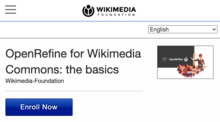
Last month, we announced a new WikiLearn course for OpenRefine for Wikimedia Commons: to learn how to upload and edit files on Wikimedia Commons with OpenRefine. This course is now also translated into Spanish and French.
Enroll here:
- English - start course: OpenRefine for Wikimedia Commons: the basics
- Spanish / Español - start course: OpenRefine para Wikimedia Commons: conceptos básicos
- French / Français - start course: OpenRefine pour Wikimedia Commons : les bases
This online course is available at any time, for free. Anyone with a Wikimedia account can enroll with one click of a button. It can be followed at your own pace, with computer-graded exercises.
The course is suitable for Wikimedians, Wikimedia affiliate staff, and partners (e.g. GLAM staff). Following the course takes an average of 6 to 8 hours.
This course was developed as part of the Wikimedia Foundation's training and sustainability grant to OpenRefine. It can be easily translated to other languages as well. If you want to contribute a translation, then get in touch with Giovanna Fontenelle. Portuguese, Brazilian Portuguese, Basque, and Italian translations are underway.
Certified OpenRefine-Wikimedia trainers
In April 2024, a group of international, new certified OpenRefine-Wikimedia trainers graduated after an intensive, six-month train the trainer course. Anyone can now approach them for demonstrations, workshops, presentations and tutorials.
You can find the list of certified trainers on meta:OpenRefine/Training.
OpenRefine course in three more languages and International Museum Day challenges
OpenRefine course to edit and upload files to Commons now in Spanish, French, and Italian

Last month, announceed the course OpenRefine for Wikimedia Commons: the basics was finally available in English. This April, we are excited to share that this training has been translate and is now available in three languages: Spanish, French, and Italian.
- Spanish / Español: OpenRefine para Wikimedia Commons: conceptos básicos
- French / Français: OpenRefine pour Wikimedia Commons : les bases
- Italian / Italiano: Introduzione all'uso di OpenRefine per Wikimedia Commons
This course can be easily translated into other languages (more about the translation process here and here). More translations are on the way, including Portuguese, which will be launched soon. Get in touch with us, if you interested in translating this course too.
This course is available at any time for free. The participant only needs a Wikimedia account and they can follow it at their own pace, with computer-graded exercises. A certificate is awarded at the end and an average of 6 to 8 hours is needed to complete the course. In addition, for Wikimedians, we also provide a template for a badge they can add to their user page on Meta-Wiki.
Please, share these translations with people who speak these languages and who you think might be interested in learning more about OpenRefine or Wikimedia Commons.
International Museum Day 2024 on Wikimedia: Take part in the media and data challenges
This May, we are celebrating the International Museum Day 2024 with a series of activities in which anyone can participate following this year’s theme: Museums for Education and Research. Individual Wikimedians, affiliates, and user groups are invited to respond to the challenges to increase museum coverage on Wikimedia.
Media
Document museums around the world working with education and research. Upload to Wikimedia Commons photos of their events, tours, and workshops; specialist libraries and archives; accessibility resources; or conservation in progress. Follow the instructions on this page, which includes a map of museums around the world.
Data
- Structured Data on Commons: Add or enhance the data for images of museum buildings and spaces, as well as the collections they hold, such as paintings, sculptures, photographs, historical and natural objects, and manuscripts. The data challenge page suggests the types of data you can add, how to find images to work with, and different approaches to making edits.
- Wikidata: Add or enhance the items about museums. The data challenge page has queries to get started, such as museums on Wikidata without a country but with coordinates; paintings on Wikidata without an image; a list of curators by birthplace; as well as a table with a list of very important data missing from museums items on Wikidata by country.
If you register on this dashboard, your edits will be counted and shared with ICOM. This page has guidelines for organizing events and campaigns, including some beautiful visuals.
Wikimedia CH is also organizing a panel discussion for May 17th, about ‘Wikimedia, Museums, and Education’, including expert speakers from the museum sector. The chapter has also launched a series of short videos about museums.
-
The Magic of Museums: Dynamic Centers of Education and Innovation
-
Fascinating World of Museum Education
More about the #IMD2024 on the Meta-Wiki portal or this Diff blog post.
May's GLAM events
| <<< previous month | May 2024 | next month >>> | ||||
|---|---|---|---|---|---|---|
| Monday | Tuesday | Wednesday | Thursday | Friday | Saturday | Sunday |
| 29 |
30 |
1 |
2 |
3 |
4 |
5 |
| 6 |
7 |
8 |
9 |
10 |
11 |
12 |
| 13 |
14 |
15 |
16 |
17 |
18 |
19 |
| 20 |
21 |
22 |
23 |
24 |
25 |
26 |
| 27 |
28 |
29 Wikidata workshop at Maastricht University, the Netherlands. See this LinkedIn post
|
30 |
31 |
1 |
2 |
| Home | About | Archives | Subscribe | Suggestions | Newsroom |










